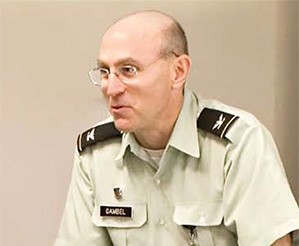
Social work ethics and practice are at the heart of providing medical care and support to our men and women in uniform,” says Colonel Jeff Gambel, MD, who is chief of the Amputee Clinic and program director of Physical Medicine & Rehabilitation Residency at Walter Reed Army Medical Center in Washington, D.C. This synergy of social work and health care has occupied Gambel’s imagination—and shaped his career path—for more than twenty-five years.
A Baltimore, Maryland, native, Gambel grew up working in his family’s junk business, located in neighborhoods whose residents found life a major struggle. Academic interest in applied social sciences was a natural complement to these early experiences. The University of Michigan’s curriculum in social treatment made the MSW program a logical step for him.
After graduating from the University of Michigan, Gambel worked for seven years as a clinical social worker at Henry Ford Hospital in Detroit, supporting neurosurgery patients and their families. He focused not only on developing his social work skills, but also on testing the depth of his passion for health care.
Gambel finished medical school with support from the U.S. Army’s Health Profession Scholarship Program and completed an internal medicine internship in Texas before supporting peacekeeping forces in the Sinai, Egypt, for a year. After completing a residency in public health and general preventive medicine, he was involved in a wide range of epidemiological, infectious disease research projects interspersed with deployments as a preventive medicine officer to Haiti and Southwest Asia.
Yet Gambel “had an itch. At heart, I still wanted to provide direct patient care.” After five years as an Army preventive medicine officer, he completed a residency in Physical Medicine and Rehabilitation (physiatry).
In his capacity as chief of the Amputee Clinic and program director, Gambel, along with the physical rehabilitation team, works with “tactical athlete” amputees—young, otherwise healthy, adults who suffer major, blast-related limb loss and related injuries—and their families. Unlike past conflicts, families often reunite with a wounded Service member at Walter Reed just days after the injury overseas. So the team—doctors, nurses, social workers, rehabilitation therapists, psychologists, and others—care for the family unit.
The goal? Help these tactical athletes reach the highest level of function possible and, relying on the core social work principle of self-determination, return to their lifestyle of choice—back to work, back to play, back to their relationships, and sometimes even back to active duty.
—Elizabeth Leimbach Zambone is a freelance editor and writer living in Charlottesville, Virginia.